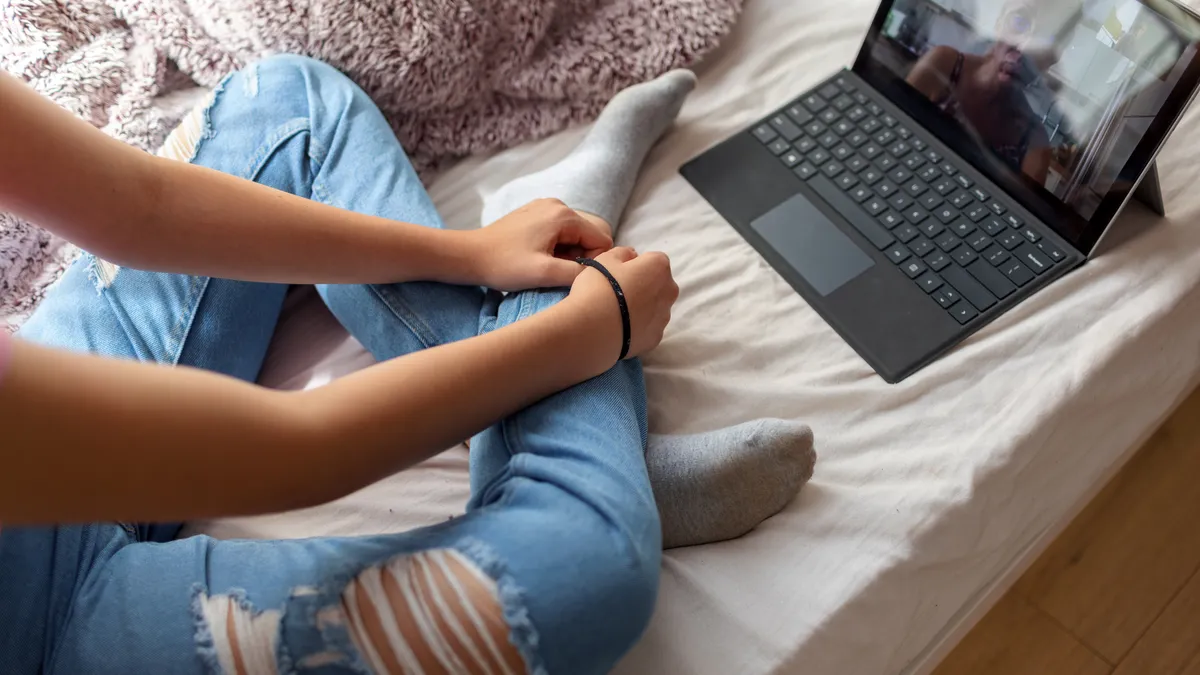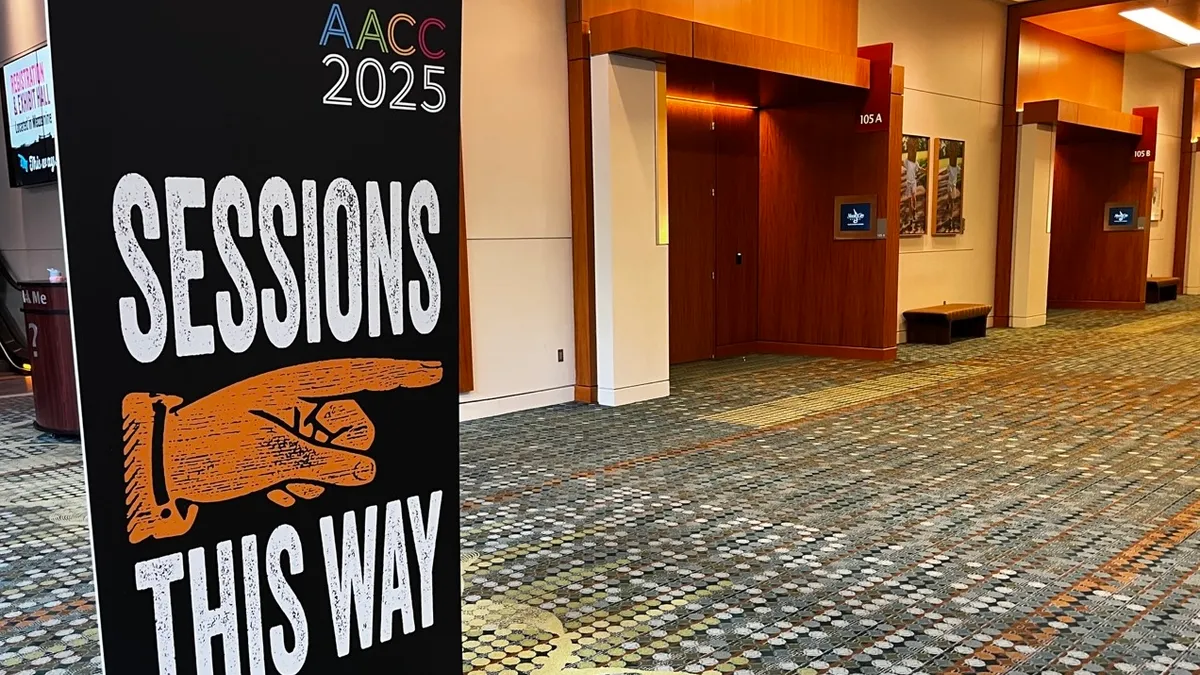In October, the counseling center at the University of North Carolina at Chapel Hill had a waitlist for the first time in 14 years. It would take a week before students could receive support.
The center’s solution was virtual.
"The university really leapt into action and found us a telehealth option to help expand our capacity quickly," said Avery Cook, interim director of counseling and psychological services at UNC-Chapel Hill. The center, which already employed 36 health professionals when fully staffed, saw the wait time disappear almost immediately, according to Cook.
This month, the university signed its second contract with Uwill, a Massachusetts-based teletherapy company. The first agreement ran from October to the end of May, covering most of the traditional academic year. Some 166 students have used the service through UNC-Chapel Hill since mid-October.
The renewal runs through November, giving students the option of teletherapy during summer break. Students are eligible to access all of the counseling center's services, including its remote mental health services, without enrolling in class and paying the university's summer semester health fee.
More and more, colleges are turning to outsourced telehealth services as a way to offer counseling support to students even when class is out of session.
Shasta College is one of 20 California community colleges that launched a 24/7 telehealth option for students this spring. The college had previously offered remote health services with its in-house staff, consisting of a psychological counselor and a nurse. But two people could only do so much and were limited by traditional business hours, according to Sandra Hamilton Slane, the dean of student services at Shasta.
"Let's face it, students don't just stress and have needs during the work hours," Slane said.
For its 24/7 remote mental health services, Shasta contracts with another telehealth firm, the Texas-based TimelyMD. The program was initiated by the Foundation for California Community Colleges.
Some 37% of California students on TimelyMD used its services outside of regular counseling center hours in 2021, according to the company.
"A lot of institutions are noticing that their students want more access to mental health care and to support in general," said Seli Fakorzi, director of mental health operations at TimelyMD. She joined the company in 2021, after it saw a huge spike in interest in mental health.
Prior to the pandemic, the vast majority of students who used TimelyMD used it for medical assistance for physical ailments, and only 10% of students sought mental health services. Now, 75% of students are looking for counseling services, with 60,000 mental health visits in the last 12 months, according to the company.
"Not every student is in a moment of crisis. Some just need someone to talk to. It's preventative care too," Fakorzi said.
Students’ needs don't go on break
Students' need for counseling services doesn't go away when they leave campus for break, and Shasta students can still use TimelyMD through the college over the summer.
"If they were registered in the spring or they're registered for next fall, they'll be able to access these services," Slane said.
Since the program began, around 170 students have enrolled in the service and 50 have accessed counseling services, at a cost to the college of about $100,000 a year, Slane said. Shasta enrolled just over 8,000 students in 2020, according to federal data.
Slane's office is working to enroll students preemptively, rather than trying to walk them through the process remotely when they urgently need help. Telehealth options are actively promoted to students during class registration and on the college's virtual bulletin board.
“What I try to tell students is the time to get enrolled and register with a network is not when you're in crisis,” Slane said. “It can be overwhelming. You want to have easy access at your fingertips when you need it most.”
For Slane, a big selling point was the large number of counselors from diverse backgrounds available to Shasta students at any given time.
"With only a small staff on campus, we represent just a handful of cultural backgrounds," she said. "This way, students could have choices about meeting with someone whose experience better matches their own, regarding gender identities, racial and ethnic background, things like that."
Counselors can also remotely connect students to basic needs support that can help cover things like food and housing assistance, transit support and bill payments.
The University of Virginia rolled out a similar partnership with TimelyMD in September. Any student who paid the college's mandatory health fee has immediate access to teletherapy regardless of the time of year, in addition to the counseling center's traditional mental health offerings. The university has had some 3,500 mental health visits through the service since the around-the-clock option was launched, according to Fakorzi.
Columbus State Community College, in Ohio, also contracted with Uwill to expand its counseling options and to work to break down the stigma around therapy.
"We're hoping that the use of this platform, with its multiple modalities, will help," said Diana Wisse, senior director of student affairs at Columbus State. "Students don't have to walk into an office space. We're still here to help with that if they want in person, but now there's another option."
Because community colleges often serve nontraditional students, Wisse said that any student who has recently been enrolled at Columbus State can access its telehealth services. If an individual typically takes classes in the spring and summer while taking the fall semester off, they will still be eligible during that time, she said.
Not the answer for everyone
The increased interest in telehealth on campuses has received some pushback from college workers who say it is overshadowing students’ need for more in-person counseling services. Critics have also said that outsourcing mental health services risks funneling students to service providers who don't understand them.
Remote therapy is best when it serves as another tool for educators and students, instead of as a replacement for what's already there, said Amy Powell, director of campus engagement and student affairs at Uwill.
"Teletherapy isn't the answer for everybody," said Powell, who previously served as Duke University's vice dean of students. "It's absolutely a great solution for the majority of students, but it’s an expansion to college campus services."
At UNC-Chapel Hill, teletherapy is meant to be an additional option for students and not the solution for every problem, according to Cook.
"We think of it as a model of therapy that is hyper-focused on an issue that can be treated in a brief period of time," Cook said.
While there's no limit on the number of sessions a student can participate in, telehealth is meant to treat situational challenges, rather than chronic issues, she said.
"We have referral coordinators that help folks connect with open-ended therapy, be it in-person or via telehealth," Cook said. "Our goal is to make sure we get whatever mental health needs students have taken care of."
At Columbus State, teletherapy is part of what Wisse called a holistic approach to student health.
The college created the Department of Student Wellbeing during the pandemic and, beginning this summer, the department will offer well-being coaching. The program will expand in the fall, when peer-to-peer coaching will launch.
"It's a proactive way of reaching out to students to work on an issue," Wisse said.
UNC-Chapel Hill, Shasta and Columbus State all indicated an interest in maintaining the 24/7 telehealth services after the point when the pandemic is no longer considered a national health emergency.
"We want to meet our students where they are," Wisse said. "Many are parents, caregivers. They work full-time jobs or even multiple jobs. We want to be able to provide services and hours that are good for them."





















